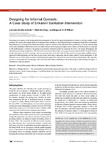Designing for Informal Contexts: A Case Study of Enkanini Sanitation Intervention

View/
Date
2016Author
Ambole, Lorraine Amollo
Swilling, Mark
M’Rithaa, Mugendi K.
Metadata
Show full item recordAbstract
Increasing social agency in the design profession corresponds to the call for greater participation of science in solving complex social problems. We analyse the complex problem of informal urban sanitation in the Enkanini informal settlement in South Africa to articulate the facilitatory role of design in the collaborative effort to improve sanitation in the settlement. More specifically, an in-depth understanding
of the multi-stakeholder collaboration in the case offers solutions for designing in complex social contexts. In the discussion, we expound
on the methodological concerns of designing in an informal settlement context by analysing the role of the design ethnographer and articulating core design competencies. This leads to the conceptualisation of infrastructuring as an open-ended model for design facilitation in informal contexts, in which challenges and inconsistencies have to be dealt with. We also contrast the open-ended, multidisciplinary approach of infrastructuring with the more design-centred participatory approaches that are better suited to literate participants. In the Enkanini case, we had to adopt a narrative-style participatory approach to capture the rich tacit knowledge of participants. The paper thus answers to the need for both technological and social innovation while contributing to the methodological understanding of design as a collaborative, long-term process.
